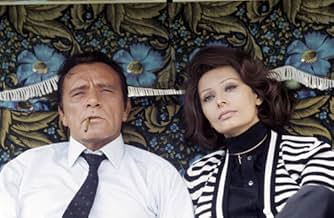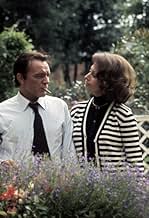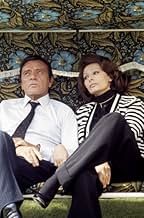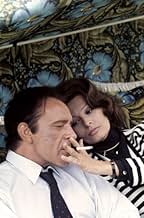Aggiungi una trama nella tua linguaThe charming Adriana gets sick after her husband's death. Her brother-in-law takes her on a journey to meet a doctor, while love overwhelms them.The charming Adriana gets sick after her husband's death. Her brother-in-law takes her on a journey to meet a doctor, while love overwhelms them.The charming Adriana gets sick after her husband's death. Her brother-in-law takes her on a journey to meet a doctor, while love overwhelms them.
- Premi
- 2 vittorie
Isabelle Marchall
- Florist
- (as Isabelle Marchal)
Francesco Lauriano
- Lawyer assistant
- (as Franco Lauriano)
Trama
Lo sapevi?
- QuizFinal film directed by Vittorio De Sica.
- ConnessioniEdited into Lo schermo a tre punte (1995)
Recensione in evidenza
Carlo Ponti in same year tried for all means becomes successful the couple Loren-Burton, in Il Viaggio and the Brief Encounter, sadly both didn't work in plenty way, some reasons could explain this failure, firstly the language barrier, another a lame screenplay and perhaps the main reason should be Taylor & Burton outstanding partnership that make clear any forthcoming attempts are doomed to failure.
The store took place in the beginning of 20th century in small village at Sicily, where the a powerful Landlord went to die letting their properties for his sons Cesare (Richard Burton) and Antonio (Ian Bannen), actually true closest friends really, a sort a fraternal love indeed, turns out that the old man spells out that Antonio should be marry with his best friend's daughter Adriana (Sophia Loren) even she on tender age had a special fondness by Cesare in fact a mutual interest, however according the local patriarchal tradition the father is whoever choose the bride for their sons, thus the marriage is accomplished whether you like or not.
Aftermaths the forbearing Cesare decides travel on business for a long time, staying aside for mostly of time, Adrianna get pregnancy and has a boy, Cesare gift-giving a brand new automobile to Antonio, sadly he gonna die in the car's accident, grieving Adriana soon is getting sick all the time and Cesare enforcing her seeking a doctor, diagnosed the cardiac decease Cesare convincing her for travel thru Italy, although the gossip spreading on Sicily village about a suppose affair leading up to a scandalous, thus a serious matter to overcame meanwhile Cesare is concerning in Adriana's failing health.
It's really a great movie carried out by Vittorio de Sica, although it didn't get enough strength, in a slow pace it never gets fire properly, lack of chemistry, too puritan offer, stayed adrift mostly of time, also a slight boring sometimes, aside the great scenario, fine sets and a fabulous wardrobe, a movie to see one time only.
Thanks for reading
Resume:
First watch: 1984 / How many: 2 / Source: TV-DVD / Rating: 6.
The store took place in the beginning of 20th century in small village at Sicily, where the a powerful Landlord went to die letting their properties for his sons Cesare (Richard Burton) and Antonio (Ian Bannen), actually true closest friends really, a sort a fraternal love indeed, turns out that the old man spells out that Antonio should be marry with his best friend's daughter Adriana (Sophia Loren) even she on tender age had a special fondness by Cesare in fact a mutual interest, however according the local patriarchal tradition the father is whoever choose the bride for their sons, thus the marriage is accomplished whether you like or not.
Aftermaths the forbearing Cesare decides travel on business for a long time, staying aside for mostly of time, Adrianna get pregnancy and has a boy, Cesare gift-giving a brand new automobile to Antonio, sadly he gonna die in the car's accident, grieving Adriana soon is getting sick all the time and Cesare enforcing her seeking a doctor, diagnosed the cardiac decease Cesare convincing her for travel thru Italy, although the gossip spreading on Sicily village about a suppose affair leading up to a scandalous, thus a serious matter to overcame meanwhile Cesare is concerning in Adriana's failing health.
It's really a great movie carried out by Vittorio de Sica, although it didn't get enough strength, in a slow pace it never gets fire properly, lack of chemistry, too puritan offer, stayed adrift mostly of time, also a slight boring sometimes, aside the great scenario, fine sets and a fabulous wardrobe, a movie to see one time only.
Thanks for reading
Resume:
First watch: 1984 / How many: 2 / Source: TV-DVD / Rating: 6.
- elo-equipamentos
- 7 nov 2023
- Permalink
I più visti
Accedi per valutare e creare un elenco di titoli salvati per ottenere consigli personalizzati
- How long is The Voyage?Powered by Alexa
Dettagli
- Tempo di esecuzione1 ora 42 minuti
- Mix di suoni
- Proporzioni
- 1.33 : 1
Contribuisci a questa pagina
Suggerisci una modifica o aggiungi i contenuti mancanti

Divario superiore
By what name was Il viaggio (1974) officially released in Canada in English?
Rispondi


























